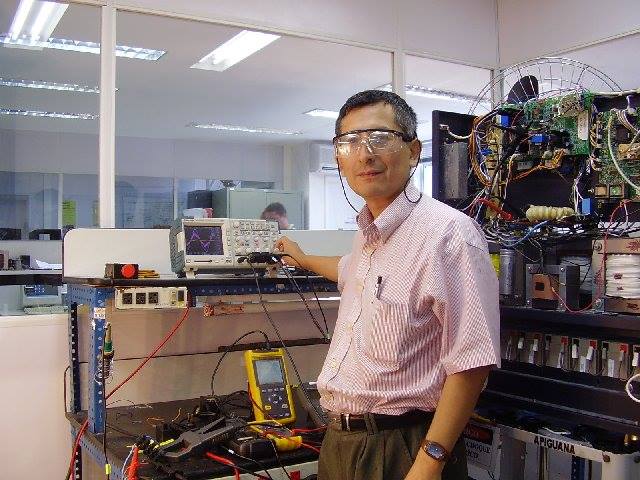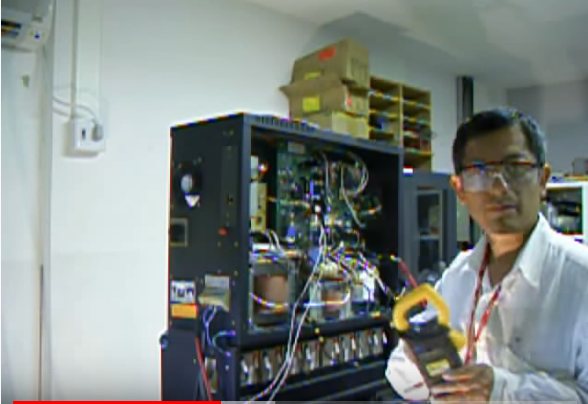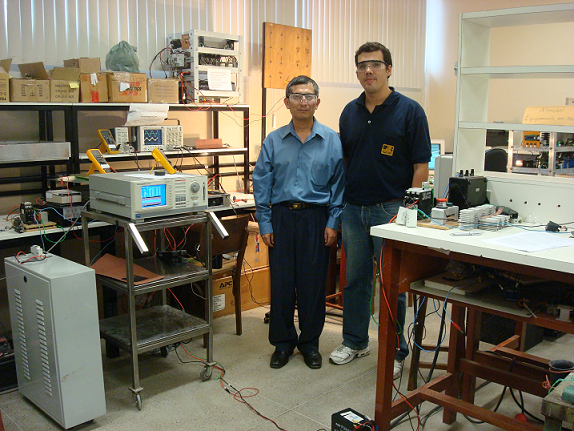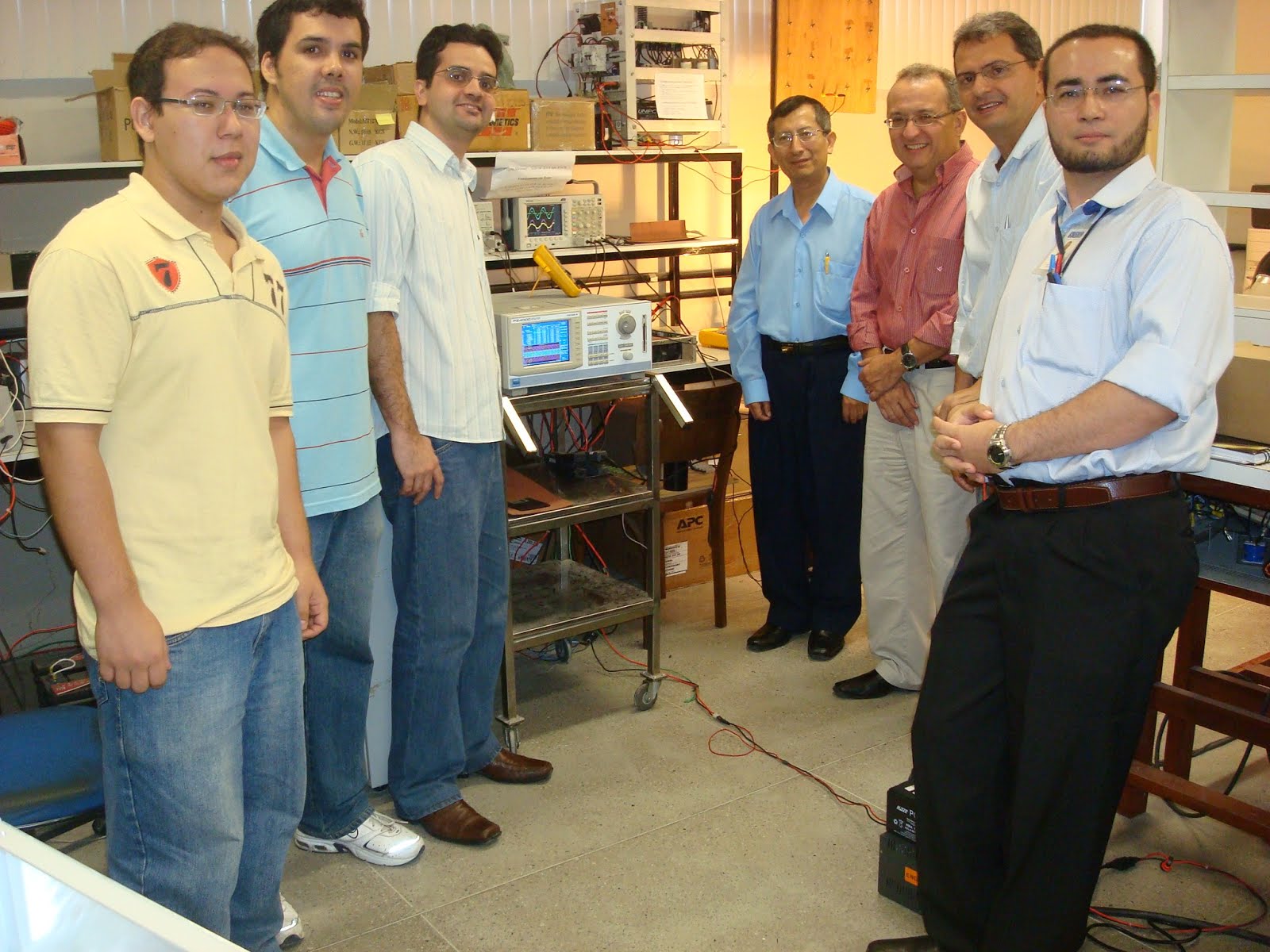quinta-feira, 16 de outubro de 2014
Control Design of Series Connected MOSFETs for High Voltage Applications
Control Design of Series Connected MOSFETs for High
Voltage Applications
Mirko Bodach, Lutz Zacharias, Björn Veit, Ringo Lehmann, Bernd Günther, Denny Ehrler
University of Applied Sciences Zwickau, Dr.-Friedrichs-Ring 2A, D-08056 Zwickau, GERMANY,
Mirko.Bodach@fh-zwickau.de, Bjoern.Veit@fh-zwickau.de, Lutz.Zacharias@fh-zwickau.de,
Ringo.Lehmann@fh-zwickau.de, Bernd.Guenther@fh-zwickau.de, Denny.Ehrler@fh-zwickau.de
Abstract
A new electro-mechanical converter concept for renewables needs a special DC / DC converter.
The converter has to transform a voltage of about 8 kV into a lower voltage of about 400 volts
covering a power range of 250 up to 1,000 W. Using this type of converter, semiconductor
switching elements are required, which can handle a voltage of about 8 kV and carrying a direct
current of about 60 mA.
WEB SEMINARY 18/10/2014 -10A.M. Switch Mode Power Supply Measurements using Oscilloscopes
Switch Mode Power Supply Measurements using Oscilloscopes
PRESENTER Johnnie Hancock, Oscilloscope Product Manager, Keysight Technologies Johnnie Hancock is an Oscilloscope Product Manager at Keysight Technologies. He began his career with Hewlett-Packard in 1979 as an embedded hardware designer, and has over 35 years test and measurement experience in various roles for HP, Agilent, and now Keysight Technologies. Johnnie is currently responsible for application support activities and he regularly speaks at technical conferences worldwide. Johnnie graduated from the Universityof South Florida with a degree in electrical engineering.
WHO SHOULD ATTEND
Engineers and technicians testing or debugging switch mode power supplies.
LINK
http://www.keysight.com/main/eventDetail.jspx?cc=BR&lc=por&ckey=2477362&nid=-536902447.0&pid=1000001736%3Aepsg%3Apgr
PRESENTER Johnnie Hancock, Oscilloscope Product Manager, Keysight Technologies Johnnie Hancock is an Oscilloscope Product Manager at Keysight Technologies. He began his career with Hewlett-Packard in 1979 as an embedded hardware designer, and has over 35 years test and measurement experience in various roles for HP, Agilent, and now Keysight Technologies. Johnnie is currently responsible for application support activities and he regularly speaks at technical conferences worldwide. Johnnie graduated from the Universityof South Florida with a degree in electrical engineering.
WHO SHOULD ATTEND
Engineers and technicians testing or debugging switch mode power supplies.
Onde e quando
| Preço | Data(s) | Local | Para mais informações |
|---|---|---|---|
| Gratuito | 2014-11-18 10:00 Pacific | At Your PC | Enroll to view the November 18, 2014 live broadcast |
http://www.keysight.com/main/eventDetail.jspx?cc=BR&lc=por&ckey=2477362&nid=-536902447.0&pid=1000001736%3Aepsg%3Apgr
quarta-feira, 15 de outubro de 2014
PCIM 2014 FPGA-Based Multilevel PWM Single-Phase Cascaded Inverter for ...
PCIM SOUTH AMERICA 2014 INTERNATIONAL CONFERENCE AND EXIBITION FOR POWER ELECTRONICS 14-15 OUTUBRO FPGA-Based Multilevel PWM Single-Phase Cascaded Inverter for Power Electronics Research.
segunda-feira, 13 de outubro de 2014
Design and Implementation of a Fuzzy Adaptive Sliding-Mode Voltage Control System for Three-Phase UPS Inverter Khawar Naheem DIVISION OF ELECTRONIC AND ELECTRICAL ENGINEERING DONGGUK UNIVERSITY SEOUL
( Abstract )
Nowadays, the nonlinear nature of electric loads leads to a strong demand of a high-quality and reliable power source both by the customers and utilities. To address this issue, the uninterruptible power supplies (UPSs) are extensively employed for the critical loads such as communication systems (i.e., data centers), medical support systems, semiconductor manufacturing systems, etc. For improving the power quality using UPS system, it is important to achieve the sinusoidal output voltage waveform with very low total harmonic distortion (THD) regardless of the load types. Typically, the inverter with LC output filter in the UPS system is a suitable solution to fulfill this requirement. The main criteria to evaluate the regulation performance of the UPS inverter output voltage are fast dynamic response, small steady-state error, and low THD. Furthermore, the various load conditions (abrupt load changes, unbalanced load, and nonlinear load) including parameters uncertainties extremely degrade the performance of the UPS inverter. Thus, an appropriate control strategy is desired to sufficiently meet the performance criteria of the UPS systems under any type of electrical loads and uncertainties.
LINK
http://www.mediafire.com/view/wg9c9ogcdtpdz46/FUZZY_INVERTER.pdf
Robust Control of a Grid Connected 3 Phase 2 Level Photo Voltaic Inverter and Development of an Inverter Operating SW Using Test Driven Development Approach Ahn, Kyung Pil
Robust Control of a Grid Connected 3 Phase 2 Level Photo
Voltaic Inverter and Development of an Inverter Operating
SW Using Test Driven Development Approach
Ahn, Kyung Pil
(Supervisor Lee, Young Il)
Dept. of Control and Instrumentation Eng.
Graduate School of Industry and Engineering
Seoul National University of Science and Technology
This study discusses robust control of grid connected three-phase two-level photo voltaic inverter where LC filter is used and its reliable implementation method for the system.
The suggested control method uses the cascaded strategy in which inner-loop controller for the ac current control and outer-loop controller for the dc-link voltage are used. In the inner-loop ac current controller, it is important to maximize convergence rate and keep the stability at the same time. So the optimal controller design method based on the LMI (Linear Matrix Inequality) is used with the integration action. Though this method, it can achieve high performance in term of tracking the reference as well as eliminate the offset-error. More over it guarantees system stability even when there are parameter mismatch by considering the parameter uncertainty set. In the outer-loop dc-link controller the PI controller is used with the dc-ac current linearization. So it can have concurrent performance though overall inverter operating condition.
On the other hand, the high power product such as three-phase photo voltaic inverter is in the mission-critical area due to its riskness of an accident. More over the photo voltaic inverter system become more an more complex with increasing requirement of functions in the grid connection rule for each country. With these trend it is difficult to keep the system integrity. This study shows the cases how the inverter operating SW can be builded using Test Driven Development (TDD) approach.
LINK
http://www.mediafire.com/view/bd7kt3oq2d6n34g/CONTROL_INVERTER_PHOTOVOLTAIC.pdf
quarta-feira, 8 de outubro de 2014
terça-feira, 7 de outubro de 2014
PARTICIPAÇÃO EM 3º. Diálogo Brasil-Alemanha de Ciência, Pesquisa e Inovação SÃO PAULO BRASIL-30 SETEMBRO-01 OUTUBRO 2014
O dia 01 de Outubre de 2014 ,se realizou com muito exito ou 3° Diálogo Brasil-Alemanha de Ciência,Pesquisa e Inovação,Dando sequência ao primeiro dia do evento, no qual foi apresentada uma “Leibniz Lecture” pelo matemático Günter Ziegler, nesta quarta-feira foram apresentados dois painéis: Dynamical Phenomena in Complex Networks, que abordararom a investigação de fenômenos da natureza, como climáticos ou neurológicos, a partir de sua interpretação através de sistemas complexos interdisciplinares e; Equações para uma Matemática Atraente, que discutiu inovações no ensino da disciplina na educação básica e a influência de sua didática em outras disciplinas, bem como a necessidade do estímulo à formação de profissionais para que seja suprida a escassez de mão de obra nas chamadas áreas MINT (matemática, informática, ciências naturais e tecnologia).
O Diálogo Brasil-Alemanha de Ciência, Pesquisa e Inovação é um evento organizado pelo Centro Alemão de Ciência e Inovação São Paulo (DWIH-SP). A presente edição tem como tema principal a Matemática.
Foi para mim como Engenheiro Eletrônico muito grato,intercambiar ideas com grandes cientistas do Brasil e Alemanha,as Matemáticas estão em toda área de nossa Sociedade,desde o pronostico do tempo,na Bolsa de valores,na Engenharia Aeroespacial,BioEngenharia,Nanotecnologia,Modelos Matematicos do Transporte Urbano,Estudo de probabilidade de terremotos e Sequias,meus parabens ao DWIH-SP pela excelente organização e escolha,e muito importante que as Empresas apoiem esta serie de eventos porque pode gerar transferencias de tecnologias e conhecimentos.
German House of Science and Innovation São Paulo (DWIH)
http://www.dwih.com.br/
quinta-feira, 2 de outubro de 2014
Assinar:
Postagens (Atom)




































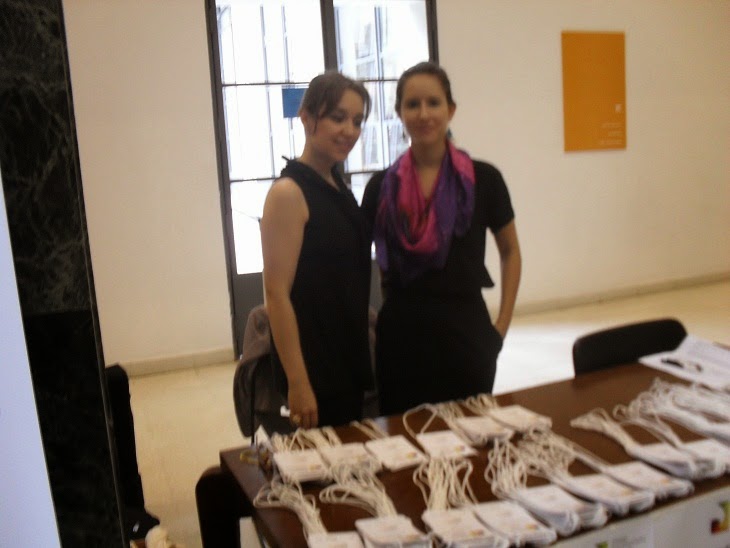




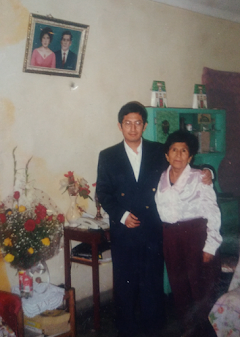





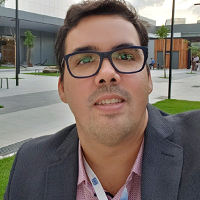






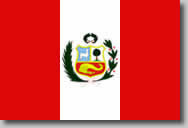

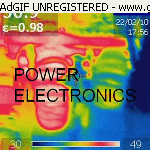




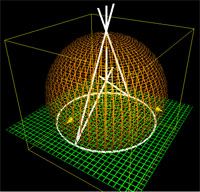


 JOSIL ARTISTA PLASTICO FORTALEZA CEARA BRASIL AV.HERACLITO GRAÇA 41 TEL(85)32542378
JOSIL ARTISTA PLASTICO FORTALEZA CEARA BRASIL AV.HERACLITO GRAÇA 41 TEL(85)32542378